Imagining a Basque National Team Ahead of the World Cup
The World Cup is merely a couple of months away and once again, there won’t be a Basque national soccer team representing the Basque Country. Hopefully, the day will come when our national team is officially recognized to participate in their own right. Until then, we can only imagine how our team would look like.
And that’s exactly what Tre’ Atkinson does in this article published originally by Bleacher Report on May 14, 2014. You can say I’m bragging if you want, but I think this team could do some damage in Brazil this summer.
Imagining a Basque National Team Ahead of the World Cup
By Tre’ Atkinson
The recent re-emergence of Athletic Club Bilbao and Real Sociedad has put Basque football back on the map. The Basque Country, located in Northern Spain, has a population of around 3 million with football in their blood.
Throughout the years, Basque players have helped the Spanish national team achieve success. Legends from the region, such as Joseba Etxeberria, have been regular faces for La Roja, while the likes of Fernando Llorente and Xabi Alonso helped the country win its first World Cup back in 2010.
In Spain, Catalonia has received major attention over the years due to the success of Barcelona and calls for independence. But the Basque Country also has a lot to say for itself.
Historic clubs like Athletic Club Bilbao and Real Sociedad have seen major success throughout the decades, and they are once more making their presence felt in the country. But other Basque clubs, such as Eibar, who will likely be promoted to the first division for the first time next season, are beginning to find success as well.
With the Basque Country being a very independent area that is constantly churning out top footballing prospects, it would be amazing to see the Basque national team one day competing against other European nations.
For now, Euskal Selekzioa has to settle for one friendly every year. Last December, several stars were called up to represent the Basque Country in a friendly against Peru at the new San Mames. The Basques came out 6-0 victors.
With that in mind, this article will take a look at what the Basque national team could look like today, as well as discussing just how competitive Euskal Herria could really be.
Note: For this list, a player must be born in the Basque Country, have Basque parents/grandparents, or have spent enough time in the Basque Country to qualify, just as players today must do for other countries.
Click on each photo for player information.
Euskal Selekzioa
- Gorka Iraizoz / GK (Bleach Report)
- Cesar Azpilicueta / RB (Bleach Report)
- Inigo Martinez / CB (Bleacher Report)
- Aymeric Laporte (Bleacher Report)
- Mikel Balenziaga / LB (Bleacher Report)
- Javi Martinez / DM (Bleacher Report)
- Xabi Alonso /DM (Bleacher Report)
- Ander Herrera / CM (Bleacher Report)
- Antoine Griezmann / Right Wing (Bleacher Report)
- Iker Muniain / Left Wing (Bleacher Report)
- Fernando Llorente / Striker (Bleacher Report)
- Ernesto Valverde / Manager (Bleacher Report)
Alternative Defenders and Goalkeepers
The Basque Country boasts a deep pool of talent at the back. There are several veteran players that would be able to lead the team, as well as plenty of young stars that would provide energy and a strong work ethic.
Beyond Gorka Iraizoz, there are other promising keepers. Enaut Zubikarai is a regular during friendlies, while young Kepa Arrizabalaga may turn out to be one of the best Basque keepers of all time.
French keeper Stephane Ruffier is also Basque and could fight for a starting role.
The defence could be stacked as well. Andoni Iraola, Carlos Martinez and Carlos Gurpegui are all proven and experienced defenders. Couple that with young talents such as Joseba Zaldua and the Basque Country has a lot of options to choose from
Goalkeepers and Defenders
Enaut Zubikarai (GK)
Kepa Arrizabalaga (GK)
Stephane Ruffier (GK)
Andoni Iraola (RB)
Carlos Martinez (RB)
Joseba Zaldua (RB)
Carlos Gurpegui (CB)
Mikel Gonzalez (CB)
Mikel San Jose (CB)
Borja Ekiza (CB)
Xabi Etxeita (CB)
Jon Aurtenetxe (LB)
Nacho Monreal (LB)
Alternative Midfielders
Like the rest of Spain, it is in the midfield that the Basques would boast their biggest talents.
From experience to young raw talent, the Basque midfield would have it all.
Xabi Prieto could likely make a case for a starting role, maybe even as captain, while the likes of Mikel Arteta and Markel Susaeta have plenty of matches under their belts.
The likes of Ruben Pardo and Asier Illarramendi are also immensely talented despite their age and would add a lot to the squad. Finish off the alternatives list with quality stars such as Ander Iturraspe and Raul Garcia and we really begin to get a picture of how strong the Basque midfield can be.
More than any other area of the pitch, picking who would fill the midfield roster spots would be almost impossible for the Basque national team.
Midfielders
Ander Iturraspe (DM)
Mikel Rico (DM)
Ruben Pardo (DM)
Asier Illarramendi (DM)
Markel Bergara (DM)
Mikel Arteta (CM)
Xabi Prieto (CM)
Alternative Forwards
Contrary to popular belief, Fernando Llorente isn’t the only talent forward who could represent the Basque Country.
In fact, Aritz Aduriz has featured in more friendlies than El Rey Leon and is an accomplished goalscorer in his right. Imanol Agirretxe has also turned out to be quite a lethal finisher up front for Real Sociedad and would fight for a place as well.
There are several young strikers that could fight to make the cut too. Iker Hernandez and Guillermo have been lighting up the lower divisions and would provide an energetic spark that often comes in handy.
Though Llorente is easily the top choice to start up top for Euskal Herria, make no mistake about it, he is by no means the only option.
Forwards
Ibai Gomez (LW)
Aritz Aduriz (ST)
Imanol Agirretxe (ST)
Guillermo (CF)
Iker Hernandez (CF)
Kike Sola (ST)
Gaizka Toquero (ST)
Borja Viguera (CF)
Gonzalo Higuain* (ST)
Diego Forlan* (ST)
How Competitive Would the Basque Country Be?
Even with every star choosing to play, it is safe to say that the Basque national team would not be on the same level as Spain, Italy, Germany and other European giants. That said, the Euskal Selekzioa would definitely be a very competitive team.
With a deep talent pool to choose from, the Basques would be able to field a team capable of making it out of the group stages of a World Cup.
Anchored on a very strong defense with experienced holding midfielders in front, the Basques would make things difficult for any opponent. Quick and creative forwards would be able to do the work up front and provide plenty of goals.
Any chance of having the Basque national team actually competing in international tournaments is surely a long way away—if it ever is to occur. For now, the autonomous community remains a part of Spain for the foreseeable future.
When looking at a possible Basque national team, it important to realise that there is truly no way of knowing what the team would actually look like.
The Basque Country would first have to become independent to field their own team in competitive tournaments, and even then eligibility to play for the team would likely be a tense affairs with so many players having already represented other countries.
Regardless, Basque football is reaching a new age and the world needs to pay attention. Northern Spain is filled with quality players, and one day they just might be waving the Basque flag at a World Cup or European Championship tournament.
Related posts:
- Athletic de Bilbao, stirring passions
- Once Upon a Time In The Basque Country: The beautiful story of Athletic Club de Bilbao
- San Mames
- The best part of the game
- The Lions of Bilbao: A view from the outside
- Once again, Athletic gets a jab at his ‘Basque-only players’ philosophy
Thanks for passing by: ↓
- SFCC: Special presentation by Iñaki Goirizelaia, University of the Basque Country President
- Little milestones

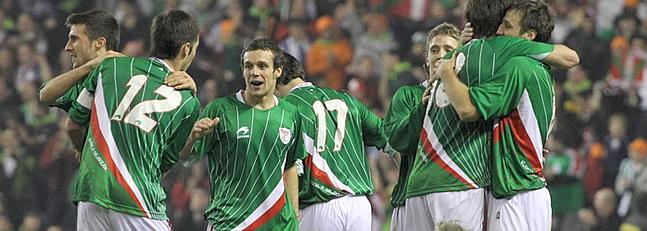
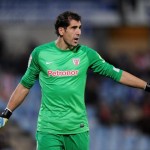

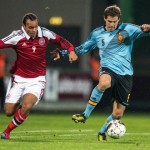
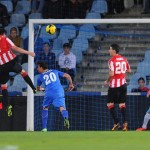
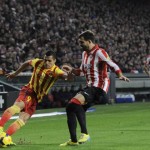


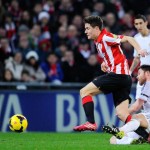



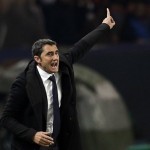

That is awesome, thanks for posting it. Do you know if there are any players from Iparralde that are good enough to add? That would be pretty cool too.
Kaixo Mark. In the “main team”, you have Aymeric Laporte and Antoine Griezmann. Then, as alternative players, Tre’ lists Stéphane Ruffier, also from Iparralde, as well as two South-American players of Basque descent, Gonzalo Higuain and Diego Forlan (although they wouldn’t be able to play even if the Euskal Selekzioa was allowed to compete). I know some day it’ll happen, you’ll see.
Fernado Llorente is not a basque player, was born in La Rioja(Rincón del Soto), and there are several Navarran players such as Muniain(Pamplona), Javi Martínez, Azpilicuelta, Gupegi(Andosilla), and so on . which is other Spanish region and the antique kingdom that the Basque country belonged to . So should the national team be called Navarre or Basque Country?.
I do not know which will be the llevel of this squad but remember that great teams has flown back home at stage 1 , so who knows….who would be defeated
If you’d had taken the time to look it up before you left the comment, you’d know that in order to be considered “Basque” under Athletic’s hiring philosophy, players have to meet one of two simple requirements:
1. Come up through the club’s young players’ reserve or the young players’ reserve of the other clubs in the Basque Country (Bizkaia, Gipuzkoa, Araba, Nafarroa, Lapurdi, Zuberoa and Nafarroa Behera, or
2. Be born in these territories.
I know this because before I wrote The Lions of Bilbao: A view from the outside (https://weblogs.eitb.eus/basqueboise/2012/05/08/the-lions-a-view-from-the-outside), I got in touch with Javier Ucha Marquiegui, Foregin Affairs and Member Service Manager for Athletic de Bilbao, to confirm this information.
Llorente started playing in Athletic’s lower divisions at 11, Muniain at 13, thus meeting requirement number 1. Javi Martinez and Azpilicueta meet the same requirement as they came up through the young players’ reserve of the other clubs in the Basque Country.
I’m not sure what your point is there at the end, because the whole point of any tournament is to qualify first, then compete to see who goes home and who stays. So yeah, who knows who would be defeated, they’d have to play first.
What are we talking about Athletic philosophy or Basque national team?. It is not the same even the main part of them complete the both squads, the point is when Llorente had not renewed his contract with San Mames’ owner club, he had been namedd betrayer and surpringsingly he was not so Basque as he had been before, same thing with Bixente Lizerazu who became totally French sixteen years ago and the he won the France’98 WC. It seems that all players sould have the same point of view and it is not over the game.
Despite the generous effort that ESAIT had done, Basque players have to compete with their respective national teams till the Independance is declared or Mr. Blatter, Plattini, Villar and so on accept ethnics or regional groups as full -law members of FIFA as the Bristish federations are.
At the challenge I guess that maybe we or they are not able to beat some high level teams as Argentina, Brasil or Italy, Germany are.
Imagining is for free but nowadays impossible is nothing as the German with three stripes trade mark said.
Athletic hiring philoshpy is completely relevant when talking about a Basque national team. You said Llorente is not Basque, well, if he is Basque as far as Athletic’s philosophy is concerned, he is also Basque to play for the Euskal Selekzioa. What happened between the fans and Llorente after he signed up with Juventus doesn’t have anything to do with the club’s philosophy.
What do you mean that Bixente Lizarazu ‘became totally French’? He was born in Iparralde, Saint-Jean-de-Luz, France. He was born French. In the Basque Country, but French.
Hopefully someday imagining will stop and we’ll be able to see whether the Euskal Selekzioa can be up there with the high level teams.
Llorente was born in Pamplona not in Rincon de Soto. His family is from Rincon de Soto.
I was wrong , but I do not know why journalists called him El Riojano if he was born in Pamplona, and Lizarazu never competed with the tricolor even he was a great player, and I remind you all the adjetives and names given him when he had taken off from Bilbao.
It’s a bizarre situation, both of them were playing at Athletic but none were born at the current País Vasco authonomical community(CAPV). So I could consider Athletic Club and Real Sociedad as the actual Basque National Teams. It’s like Milan A.C. and Inter(nazionale) in Milan, Italy, the black stripes became white, but essentially is the same topic
Policy and sport a dangerous mixture.